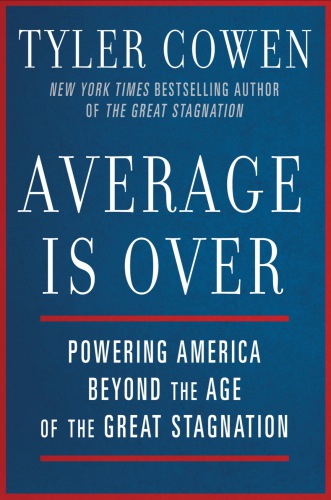
Average Is Over
Powering America Beyond the Age of the Great Stagnation
کتاب های مرتبط
- اطلاعات
- نقد و بررسی
- دیدگاه کاربران
نقد و بررسی

July 8, 2013
Economist Cowen’s muddled follow-up to The Great Stagnation, is mired in the incantation that human intuition must be sublimated to computer algorithms if we are to overcome America’s dearth of innovation—which the author blames for our shrinking economy. He glibly dismisses chronic unemployment with the statement that these “regular losers” were going to become obsolete anyway, but the good news is that, in his cheerfully libertarian laissez-faire economic model, costs will plummet as automation eliminates workers, and corporations pass the savings to consumers. What is left for human workers is a vision in which they toil in submissive tandem with machines, providing their scant human abilities to augment the superior judgment of computers. Philip K. Dick could not have crafted a more surreal vision than Cowen’s picture of a Siriesque consultant directing our choices in everything from love to medical care. Unfortunately, Cowen relies upon chapter after chapter about computerized chess (“What Games Are Teaching Us”) as support for his arguments, and neglects to provide evidence of how anyone’s life will become better, or how prosperity can emerge from this approach. Agent: Teresa Hartnett, Hartnett Agency.

July 15, 2013
Economist and social commentator Cowen (Economics/George Mason Univ.; An Economist Gets Lunch: New Rules for Everyday Foodies, 2012, etc.) urges us to prepare for "the age of genius machines." The good news for the coming decades: Who you know, where you're from or where you went to school will matter less than ever before when it comes to finding remunerative, satisfying work. Be advised, though: We're headed for a "hyper-meritocracy" where only the 10 to 15 percent of us whose skills complement intelligent machines will find that happy niche in a polarized labor market. To explain the shape of the future, Cowen looks to the world of freestyle chess, where collaboration between even a minimally competent player and a computer is already sufficiently powerful to reliably defeat a grandmaster. From the highly regularized environment of this game and others, he extrapolates a freestyle future where new technologies increasingly alter our interactions with each other and our world. A sprightly, widely allusive stylist, Cowen points to numerous present-day examples--we already live in a world where Google is the most frequently consulted "doctor," where Match.com guides many love lives, where GPS directs our travels--to help sketch the contours of the future. He examines the implications of this new man/intelligent-machine alliance for the workplace in many sectors of our economy, where self-motivators and team workers will be especially prized; for education, where professors will become more like impresarios; and for science, where problems will become too complex for any single person to solve. This new world of work will feature vast income inequality--Cowen too readily dismisses the prospects for deep social unrest this may engender--and will leave much of the nation looking like today's Texas, where the mix of cheap housing, plentiful jobs and lower-quality public services have accounted for the Lone Star boom, despite the national recession. A buckle-your-seatbelts, swiftly moving tour of the new economic landscape.
COPYRIGHT(2013) Kirkus Reviews, ALL RIGHTS RESERVED.

July 1, 2013
The gap between the haves and have-nots in the U.S. is widening as high-wage earners benefit from advantages over low-wage earners, and the average-wage earners tend to get polarized to one end or the other. Economist Cowen gives advice and predictions to help low-wage earners reverse the trend and strive for more. He points out a correlation to education and technology as key factors, and cites examples supporting the theory that if you and your skills are a complement to the computer, your wage and labor-market prospects are likely to be cheery. Machines are changing the way people work, similar to the way the freestyle model of chess has revolutionized that game by allowing players to consult with books or computers. He predicts the evolution of education and the impact and advantages of online and machine-driven education as well as related venues, including online communities and blogs. Self-motivated learners experienced with machine intelligence and data analysis will have the best chance of higher earnings now and in the future.(Reprinted with permission of Booklist, copyright 2013, American Library Association.)

























دیدگاه کاربران